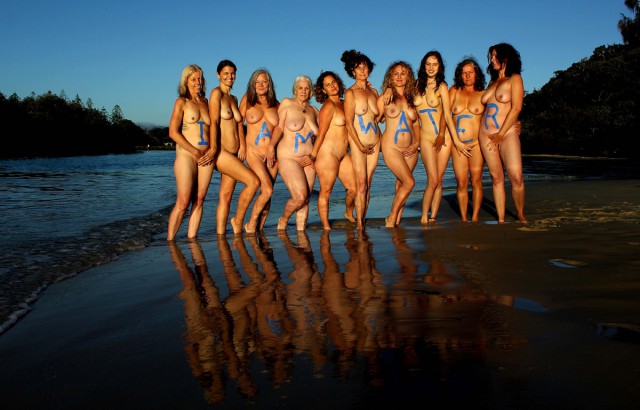 Chemical Free Landcare volunteers and supporters strip naked to show their support for an end to the use of gylphosate. Photo ©Trevor Avedissian
Chemical Free Landcare volunteers and supporters strip naked to show their support for an end to the use of gylphosate. Photo ©Trevor Avedissian
A group of north coast women have put their bodies on the line, literally, in an effort to stop councils and government authorities spraying glyphosate in their weed reduction activities.
Glyphosate, which was invented and is widely marketed by multinational chemical company Monsanto under the name Roundup, was named a ‘probable carcinogen’ by the World Health Organisation in March this year.
This action, together with the forthcoming trial of Monsanto at the International Court of Justice next year has prompted the women to take a stand.
With ‘I am water’ written on their bodies, the women are bringing attention to the protection of the essential resource from ongoing pollution with herbicides in the region.
‘Our bodies are made of water and we are one and the same as the environment. If we pollute the water with pesticides, we pollute ourselves,’ said Pietramale, local bush regenerator and co-ordinator of Byron Shire Chemical Free Landcare Nadia de Sousa Pietramale.
‘While Monsanto will go on trial for crimes against humanity and nature, in Byron shire, glyphosate, a product developed by the company and an active ingredient of many herbicides, is still being poured into the environment where it ends up in our local rivers and catchments’ she added.
‘In Byron shire we see evidence of the latest herbicide use as the death of grasses along roadsides and drains. But the use of glyphosate doesn’t stop there. It’s the main tool used by Council staff and contractors in nearly all bush regeneration sites from the top of the catchment along creeks to the lowlands. It’s also used by other government agencies including the National Parks and Wildlife Service, the Road Traffic Authority, on Crown lands and all along the train lines.
‘Contractors have been quietly spraying large areas of Bitou Bush in Tyagarah Nature Reserve. How can using a herbicide likely to cause cancer to mammals, on sandy soils surrounded by water, possibly improve coastal habitat?’
‘Community protest stopped aerial spraying of Tyagarah Nature Reserve in 2012, but National Parks has continued with large-scale ground spraying and the community remains concerned about the environmental effects of herbicide runoff into the ground water and lagoons.’
Chemical-free proposal rejected
But Nadia believes there is another way.
In 2012, volunteers provided a detailed proposal to the Northern Rivers Region National Parks for chemical-free bitou bush management in Tyagarah Nature Reserve. Nadia said the plan was rejected without any investigation. Nevertheless, volunteers have removed almost all bitou 300 metres north of the Grays Lane picnic area’.
‘We recently went there to carry on our follow-up work but the few seedlings left had been sprayed’, reported Tyagarah volunteer Gerd Kuhlmann.
‘We would like to see the spraying of Tyagarah Nature Reserve immediately stopped. The community can do much more but we need permission from National Parks to increase the area and they need to investigate the effectiveness of our methodology without rejecting it out of hand,’ Mr Kuhlmann said.
The trial of Monsanto will take place on October 16 next year at the International Court of Justice in The Hague, Netherlands.
Dozens of international food, agriculture and environmental justice groups are involved in the legal action. The trial is a ‘global citizens tribunal’ and not legally binding but such tribunals are seen as powerful tools for change in cases where the regular judicial system fails to hold powerful people or corporations accountable.
This press release was published in: Echonetdaily

 Follow
Follow